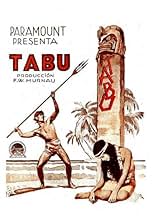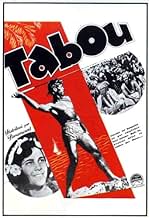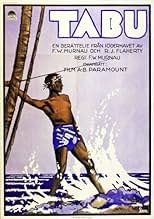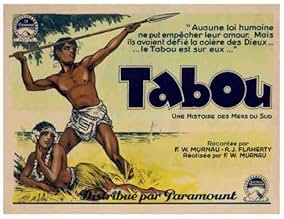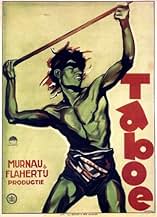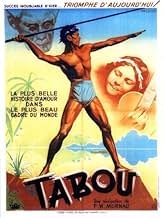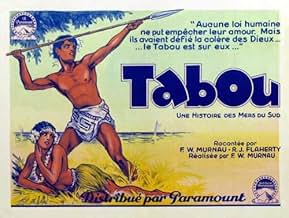Na ilha de Bora Bora, no Pacífico Sul, o amor de um jovem casal é ameaçado quando o chefe tribal declara a menina como virgem sagrada.Na ilha de Bora Bora, no Pacífico Sul, o amor de um jovem casal é ameaçado quando o chefe tribal declara a menina como virgem sagrada.Na ilha de Bora Bora, no Pacífico Sul, o amor de um jovem casal é ameaçado quando o chefe tribal declara a menina como virgem sagrada.
- Direção
- Roteiristas
- Artistas
- Ganhou 1 Oscar
- 4 vitórias no total
- The Girl
- (as Reri)
- The Policeman
- (as Jean)
- The Businessman
- (não creditado)
- The Captain
- (não creditado)
- Boys Friend
- (não creditado)
- Direção
- Roteiristas
- Elenco e equipe completos
- Produção, bilheteria e muito mais no IMDbPro
Avaliações em destaque
The best spear-fisherman on Bora Bora is a handsome young man billed simply as The Boy (Matahi). His legendary status and unparalleled skill makes him popular amongst the islanders, and soon he has caught the eye of The Girl (Reri - who went on to star on Broadway as Anne Chevalier). They romance each other, but their affair is soon halted by the arrival of emissary The Old Warrior (Hitu), who proclaims Reri as the sacred maiden. She is 'tabu', and cannot be looked upon by any man unless he wishes the punishment of death. The couple brave storm and sea to escape, an arrive in a French-colonised island, where Matahi start work as a pearl diver. But their happiness is fleeting, and Reri is soon haunted by the image of Hitu, terrified she may have angered the gods.
The plot is hardly anything new, but Floyd Crosby's Oscar-winning cinematography makes Tabu more socially aware that the film may have you believe. The subtle yet crucial involvement of the French colonists, finding amusement at Matahi's lack of understanding regarding money and material wealth, is a clear swipe at the creeping of Western civilisation. Bora Bora won't stay pure for much longer. And that adds a gravitas to Matahi and Reri's plight - not only is their romance doomed, but so are their traditions and society. It is one of the last great silent films, a reminder that sound can be an unnecessary distraction, and that picture's can sometimes genuinely speak louder than words.
www.the-wrath-of-blog.blogspot.com
The story is simple and direct. It's both a love story and a visual documentary that will appeal to Westerners accustomed to a more tech lifestyle. Parts of the narrative are conveyed by means of the writings in a ship captain's log. The writing is displayed on the screen, for viewers to read. The film's tone varies from light and cheerful at the beginning to more somber as the plot moves along.
Shot in Tahiti and Bora Bora, the film has a cast made up entirely of non-professionals. The B&W lighting is good, given the early era.
The film is one of the last of the silent period. And I'm therefore reluctant to find fault with it. The native Pacific music is really beautiful, what there is of it. I could have wished for a lot more. By contrast, the imported symphonic score is loud, nondescript, and intrusive. I guess that would be the one thing I would have changed.
Even for viewers who don't care for silent films, "Tabu: A Story Of The South Seas" might be appreciated for its documentary style visuals. For viewers familiar with silent cinema, this is a must-watch film, Director F.W. Murnau's last.
Sadly, this was to be F. W. Murnau's last film. Despite a short life, he made many great films (including this one)... and then came a car accident that left us without another three or four decades of genius.
On the bright side, cinematographer Floyd Crosby won an Academy Award for Best Cinematography for his work on this film. Crosby went on to work for a great many years, bringing out the best in such directors as Roger Corman. In "Tabu", he uses the camera to tell a story without words -- body language and eye movement tell us almost everything we need to follow the plot.
The film was not a box office success upon release, grossing just $472,000 worldwide, which failed to recoup Murnau and Paramount's investment. This seems odd today, when it is considered a classic, but there is no secret that critically successful films and commercially successful films are not always the same thing.
The Image DVD features commentary by film historian Janet Bergstrom, which is quite excellent. Other editions feature other commentary, but I have not heard it and cannot compare.
Você sabia?
- CuriosidadesProducer/director/co-writer F.W. Murnau died in a car accident a few days after starting work on the music for this film. It had its New York premiere a week later.
- Citações
The Girl: [writing a goodbye letter] I must go. Hitu is here and waits for me. You will die if I do not obey. I will go so that you may live. The tabu is upon us. I have been so happy with you far more than I deserved. The love you have given me, I will keep to the last beat of my heart. Across the great waters, I will come to you in your dreams when the moon spreads its path on the sea. Farewell.
- ConexõesEdited into Caça nos Mares do Sul (1940)
Principais escolhas
- How long is Tabu: A Story of the South Seas?Fornecido pela Alexa
Detalhes
- Data de lançamento
- País de origem
- Idioma
- Também conhecido como
- Tabu - Priča sa Južnih mora
- Locações de filme
- Empresa de produção
- Consulte mais créditos da empresa na IMDbPro
Bilheteria
- Orçamento
- US$ 150.000 (estimativa)
- Tempo de duração
- 1 h 26 min(86 min)
- Mixagem de som


